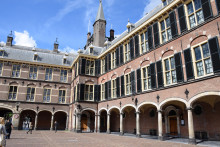English is now the official language in both Eindhoven and Twente and this is a sore spot for political parties that are opposed to the anglicisation of higher education.
Minister Van Engelshoven had previously tried to assuage the indignation. She declared that English was to be the language of communication and not the language of instruction at these institutions. Furthermore, these universities still offer a number of Dutch-taught programmes.
But political parties VVD, CDA, PVV, SP and GroenLinks do not intend to leave it at that. In a written round of questions, the members of Parliament fired a range of questions at the minister, questions which left no doubt about their parties’ political leanings.
Monitoring
For example, one area VVD wants more clarity about is monitoring measures to be implemented. ‘What steps will the minister be taking should the language policy turn out to have undesirable consequences for accessibility, for instance?’ The VVD also considers it lunacy that the vast majority of Psychology students at Twente come from Germany. They question the wisdom of funding a university study programme for the German job market.
The CDA underscores the role of the university in the region and in Dutch society in general. Is the minister not of the opinion that a university should safeguard the position of Dutch as a language of science? And should a university’s affairs and operations not be comprehensible to outsiders?
Anglicisation
The PVV accuses the minister of making an artificial distinction between a language of communication and language of instruction. The party does not consider this to be in the spirit of the law. The PVV believes the minister only wants ‘to achieve her ideological goal, namely anglicisation’. The fact that there is little protest at the university itself does not surprise the PVV given the ‘coercive English-language climate at this university’. The PVV believes people dare not speak up.
The SP foresees language problems if participatory decision-making is to be conducted in English. Can students and lecturers of Dutch origin conduct discussions and make decisions at the same level in a second language, ‘particularly when it comes to complex policy documents’? The SP also wants to know what the consequences of the new language policy could be for accessibility at the education institution.
Reaping rewards
GroenLinks has nothing against internationalisation or English-taught study programmes. ‘The education institution, as well as students and lecturers, reap the rewards of knowledge exchange and experience of different cultural expressions.’ But this party also has concerns. ‘Internationalisation must never be allowed to serve as a money spinner for universities to maintain their funding levels,’ warns GroenLinks.
Whatever the minister says, criticism of the position of English in higher education will not be going away any time soon. Nevertheless, the minister herself does not seem willing to enforce the use of Dutch as a language of communication. The House of Representatives could submit a legislative proposal to that effect itself, but it is unclear whether that would happen before the 2021 elections.







